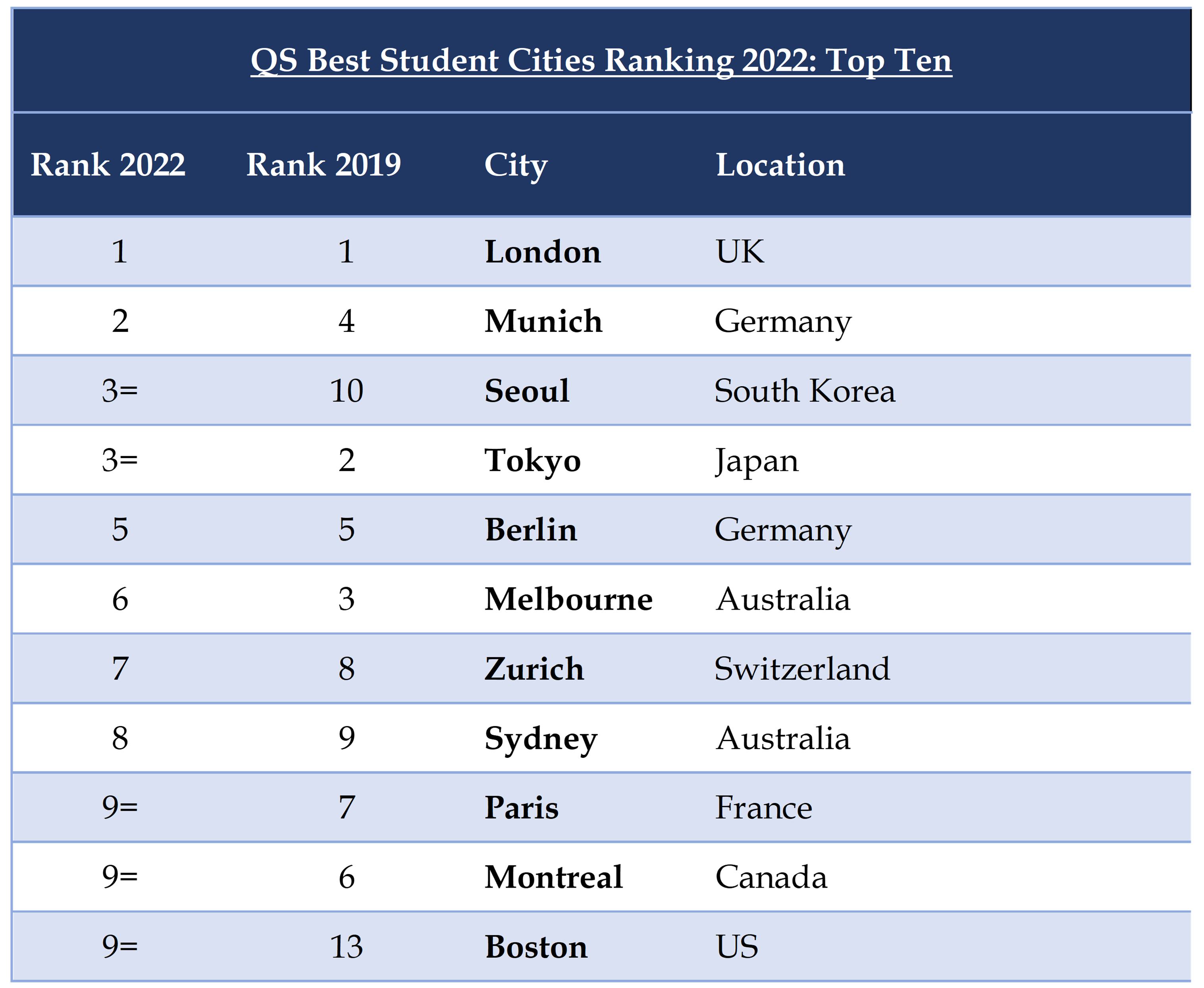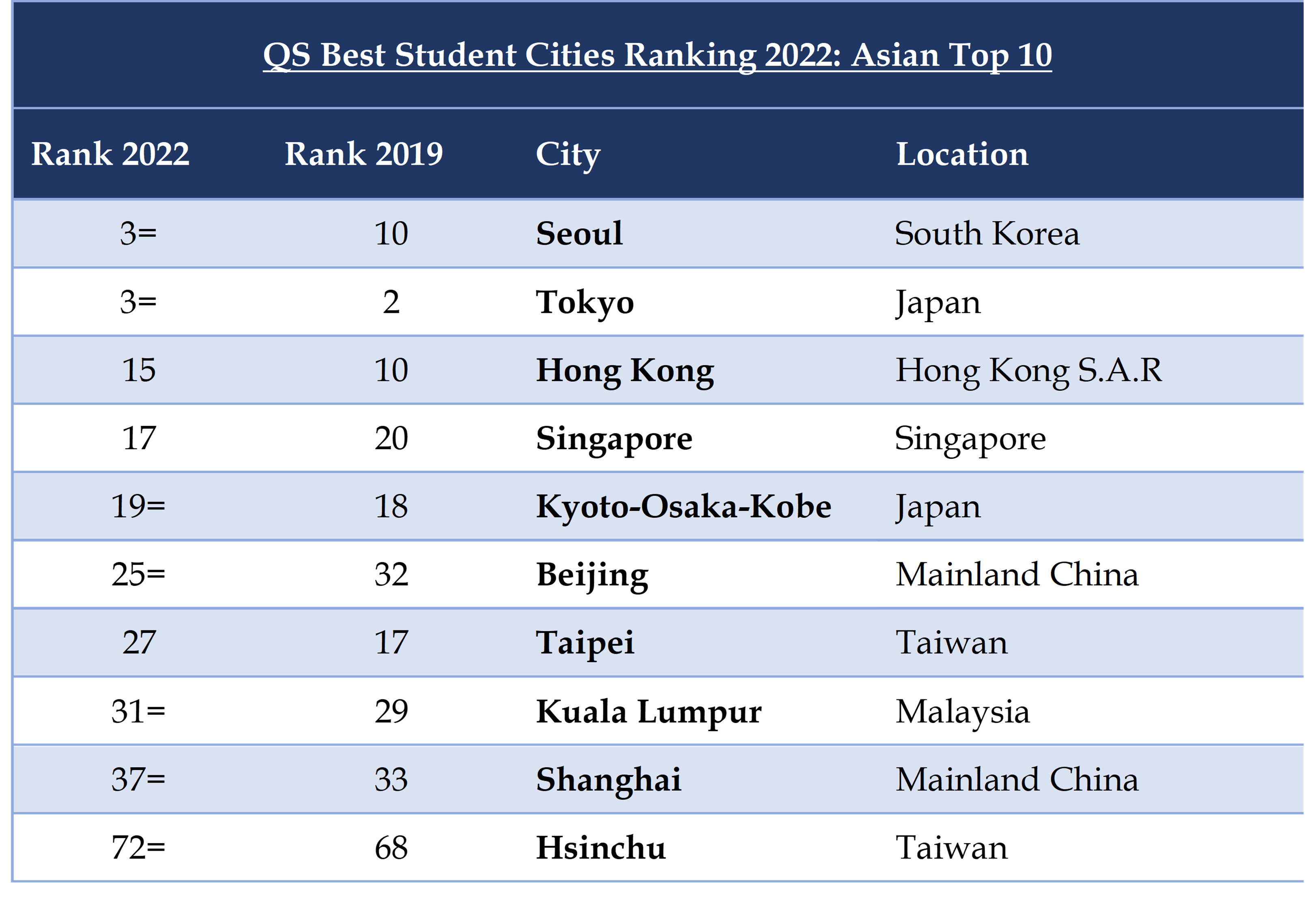Jul 28.2021
QS Best Student Cities Ranking 2022 Tokyo named world's third-best student city
London, 28th July 2021: Tokyo is the world's third-best student study destination, according to the ninth edition of the QS Best Student Cities Ranking. The results, released today by global higher education consultancy QS Quacquarelli Symonds, sees Tokyo share third spot with South Korea's Seoul. Tokyo is therefore also Asia's joint-best student city. London is the world number-one, closely followed by Munich (2nd).
Tokyo's lofty position in the rankings is because of:
- Its world-leading Desirability score (100/100). This index is a measure of the quality of life in a city, and the extent to which prospective students wish to study in that particular destination.
- The world's highest Employer Activity score (100/100). This metric measures the extent to which a city's graduates are sought-after by employers.
- Its high number of world-class universities. It achieves the world's fifth best score in QS's Rankings indicator, which measures the number of top-ranked universities in a city, according to the QS World University Rankings.
- A rising score in the Student Voice metric (now 20th, scoring, 85.5/100). This indicator accounts for the perspectives of over 95,000 former students about their study experience.
Two other Japanese cities feature in the rankings:
- Kyoto-Osaka-Kobe, which ranks joint-19th.
- Nagoya, which places 112th.
Due to improvements in the quality of its universities, Kyoto-Osaka-Kobe now ranks 10th in the Rankings indicator. Like Tokyo, it has also improved its score for Student Voice: its result of 85.0/100 is the world's 22nd-best.
Nagoya has fallen 17 places over the last year. Like Kyoto-Osaka-Kobe and Tokyo, it has recorded a decline in its Affordability mark. Its performance has also declined for Rankings (78th, down 10 places) and Student Mix (106th, down six places).
Other highlights from this year's edition include:
- Boston is the only new entrant into the top ten, rising from 13th to joint-9th. It shares the position with previously perennial table-toppers Paris (down two spots) and Montreal (down three places).
- Germany and Australia are the only locations to have two of the world's ten best student cities each.
- The United States' 15 ranked cities are suffering from a systemic decline in the Desirability indicator.
- Switzerland's Lausanne enjoys a noteworthy debut in the rankings, placing 19th.
- Moscow breaks into the top thirty, sharing 25th-position with Beijing.
- Driven by declines in Employer Activity, five of Australia's seven ranked cities have fallen.
- All three of Spain's ranked cities suffer double-digit drops in rank.
 © QS Quacquarelli Symonds 2004-2021 https://www.TopUniversities.com/. All rights reserved.
© QS Quacquarelli Symonds 2004-2021 https://www.TopUniversities.com/. All rights reserved.
Ben Sowter, Director of Research at QS, said: "As a study destination, Tokyo continues to shine. With 15 globally ranked universities, only Seoul, Moscow, and London have a greater range of world-class institutions. Students that have studied in Tokyo are offering consistently positive feedback about their experience, and graduate prospects look good, with low levels of youth unemployment. Our data shows that Tokyo also scores highly for safety. However, with affordability dropping - relative to global competitor destinations - a combination of scholarships and student subsidies would help to ensure that talented young people are as able as they are willing to study in Tokyo."
 © QS Quacquarelli Symonds 2004-2021 https://www.TopUniversities.com/. All rights reserved.
© QS Quacquarelli Symonds 2004-2021 https://www.TopUniversities.com/. All rights reserved.
QS rank cities with a population of at least 250,000, and with at least two universities placing in the QS World University Rankings. The ranking offers a powerful lens into the sentiments of both prospective and former students, with over 95,000 survey responses contributing to the Desirability (prospective students) and Student Voice (former students) indexes.
The six metric groups that QS use to compile the Best Student Cities ranking are:
- Rankings: does this city have a range of highly-ranked universities?
- Desirability: is this city a desirable place to live, and do prospective students consistently express a preference for studying here?
- Affordability: is this city affordable for students? This indicator group accounts for a range of cost-of-living metrics, including average tuition fees, the iPad Index, and the Big Mac Index.
- Employer Activity: do employers regard the city's universities highly, and are there economic opportunities for graduates? This indicator group makes use of over 75,000 responses to the QS Employer Survey, while also factoring in the levels of youth employment in a city.
- Student Mix: is this city a diverse and tolerant place in which to live? Does it have a large student population?
- Student View: do students who have actually studied in this city recommend it to their peers? This indicator group acknowledges the importance of independent peer review in the provision of high-quality recommendations. This edition is informed by the views of 95,747 survey respondents.
Further methodological information can be found at https://www.topuniversities.com/best-student-cities/methodology.
The full rankings can be found at www.TopUniversities.com from Wednesday 28th July, 11:00 BST.
-Ends-
For interviews with QS's analysts, please contact:
Simona Bizzozero
Director of Communications
QS Quacquarelli Symonds
simona@qs.com
pressoffice@qs.com
@QS_pressoffice
+ 44(0)7880620856
+44 (0) 2072847248
Jack N. Moran
Senior Public Relations Manager
QS Quacquarelli Symonds
jack@qs.com
@JackNathanMoran
+44 7474 847 430
Notes for Editors
QS Quacquarelli Symonds
QS Quacquarelli Symonds is the world's leading provider of services, analytics, and insight to the global higher education sector, whose mission is to enable motivated people anywhere in the world to fulfil their potential through educational achievement, international mobility, and career development.
The QS World University Rankings portfolio, inaugurated in 2004, has grown to become the world's most popular source of comparative data about university performance. Their flagship website, www.TopUniversities.com - the home of their rankings - was viewed 147 million times in 2020, and over 79,000 media clippings pertaining to, or mentioning, QS were published by media outlets across the world in 2020.
